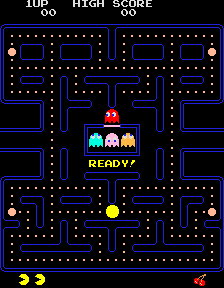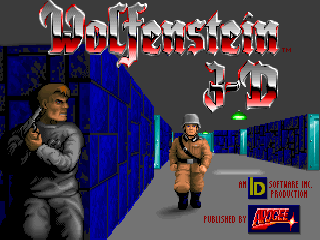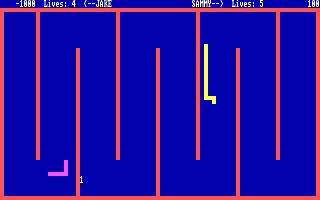Dave Mark raises some interesting questions about artificial intelligence in games over at
AIGameDev.com. First, he explains that although we're seeing more and better
AI in games, a common complaint heard from gamers runs along the lines of "why can't they combine such and such AI feature from game X in game Y." Then, Dave poses the questions for developers to answer:
We can only cite limited technological resources for so long.
...
Perhaps, from a non-business standpoint... that of simply an AI developer, we should be asking ourselves what the challenges are in bringing all the top AI techniques together into the massive game environments that are so en vogue. What is the bottleneck? Is it money? Time? Hardware? Technology? Unwillingness? Unimaginativeness? A belief that those features are not wanted by the gamer? Or is it simply fear on the part of AI programmers to undertake those steps necessary to put that much life into such a massive world?
Let me first admit that I'd wager Dave Mark knows a lot more about this stuff than me.
That's how he makes a living, after all.
My experience in developing game AI comes from choose your-own-adventure text-based games as a kid (where the algorithm was very deterministic, with few options), making villagers walk around in Jamaicanmon!,
and making spaceships run away from you instead of seeking you out in Nebulus: Ozone Riders.
I even asked
Glitch, Wes, and Jonathan (teammates on the project) to remind me of some simple
vector math and draw it out on the wet erase board for Nebulus. And I still made them go the wrong direction (which ended up being pretty cool, actually).
In other words, I haven't had much experience with AI as it's typically implemented in games, and what little experience I
have had is limited to things I wouldn't (personally) classify as AI to begin with.
Still, I have had some experience in what I might call "classical" AI (perhaps "academic" is a better term).
Stuart Russell and Peter Norvig wrote the Microsoft of
books on Artificial Intelligence (
90% market share for AI textbooks), and I've read through a fair bit of it. I've implemented a couple of algorithms, but mostly I've just been introduced to concepts and skimmed the algorithms. In addition, I've been through Ethem Alpaydin's book,
Introduction to Machine Learning, which would have comparatively fewer ideas applicable to games.
I guess what I'm trying to say is: although I have some knowledge of AI, consider the fact that Dave's experience dwarfs
my own when I disagree with him here: It is precisely the fact that we don't have enough processing power that gets in the way of more realistic AI in our games. Or, put more accurately,
the problems we're trying to solve are intractable, and we've yet to find ways to fake all of them.
I'm not convinced you can separate the failures of AI from the intractability of the problems, or the inability to design and implement a machine to run
nondeterministic algorithms for those problems in
NP.
Compared to deciding how to act in
life, deciding how to act in Chess is infinitely more simple: there are a finite set of states, and if you had the time, you could plot each of the states and decide which move gets you the "closest" (for some definition of close) to where you'd like to be N moves from the decision point. Ideally N would get you to the end, but even for Chess, our ability is limited to look ahead only a small number of moves. Luckily for
Deep Blue (and others), it turns out that's enough to beat the best humans in the world.
Even though Chess is a complex problem whose number of game states prevent us from modeling the entire thing and deciding it, we can cheat and model fewer states - when we can make an informed decision that a particular path of the decision tree will not be followed, we can forgo computation of those nodes. Still yet, the problem will be huge.
There are other ways of "faking" answers to the AI problems that face us in development.
Approximation algorithms can get us close to the optimal solutions - but not necessarily all the way there. In these cases, we might notice the computer doing stupid things. We can tweak it - and we can make special case after special case when we notice undesired behavior. But we are limited in the balance between human-like and rational. Humans are not rational, but our programs (often) are made to be.
Presumably, they give the policeman in
GTA 4 a series of inputs and a decision mechanism, and he's thinking purely rationally: so sometimes the most rational thing for him to do based on the decision model we gave him is to run around the front of the car when he's being shot at. Sometimes he jumps off buildings. (Video via
Sharing the Sandbox: Can We Improve on GTA's Playmates?)
It may not be smart, but it is rational given the model we programmed.
You can make the decision model more complex, or you can program special cases. At some point, development time runs dry or computational complexity gets too high. Either way,
game AI sucks because the problems we're trying to solve have huge lower bounds for time and space complexity, and that requires us to hack around it given the time and equipment we have available. The problems usually win that battle.

Game AI has come a long way since
Pacman's cologne (or maybe he just stunk), and it will get better, especially as we move more gaming super-powerful servers. Still, it's far from ideal at the moment.
What do you have to say? (Especially the gamer geeks: programmers
or players)
Hey! Why don't you make your life easier and subscribe to the full post
or short blurb RSS feed? I'm so confident you'll love my smelly pasta plate
wisdom that I'm offering a no-strings-attached, lifetime money back guarantee!
Since the gift buying season is officially upon us, I thought I'd pitch in to the rampant consumerism and list some of the toys I've had a chance to play with this year that would mean fun and learning for the programmer in your life. Plus, the thought of it sounded fun.
Here they are, in no particular order other than the one in which I thought of them this morning:
More...
- JetBrains' IntelliJ IDEA: An awesome IDE for Java. So great, I don't mind spending the $249 (US) and using it over the free Eclipse. The Ruby plugin is not too shabby either, the license for your copy is good for your OSX and Windows installations, and you can try it free for 30 days. Martin Fowler thinks IntelliJ changed the IDE landscape. If you work in .NET, they also have ReSharper, which I plan to purchase very soon. Now if only we could get a ColdFusion plugin for IntelliJ, I'd love it even more.
- Programming Ruby, Second Edition: What many in the Ruby community consider to be Ruby's Bible. You can lower the barrier of entry for your favorite programmer to using Ruby, certainly one of the funner languages a lot of people are loving to program in lately. Sometimes, I sit and think about things to program just so I can do it in Ruby.
If they've already got that, I always like books as gifts. Some of my
favorites from this year have been: Code Complete 2, Agile Software Development: Principles, Patterns, and Practices which has a great section on object oriented design principles, and of course,
My Job Went to India.
I have a slew of books I've yet to read this year that I got from last Christmas (and birthday), so I'll have to
list those next year.
-
Xbox 360 and a subscription to
XNA Creator's Club (through Xbox Live Marketplace - $99 anually) so they can deploy their games to their new Xbox. This is without a
doubt the thing I'd want most, since I got into this whole programming thing because I was interested
in making games. You can point them to the
getting started page, and they could
make games for the PC for free, using XNA (they'll need that page to get started anyway, even if you
get them the 360 and Creator's Club membership to deploy to the Xbox).
-
MacBook Pro and pay for the extra pixels. I love mine - so much so,
that I intend to marry it. (Ok, not that much, but I have
been enjoying it.)
The extra pixels make the screen almost as wide as two, and if you can get them an extra monitor I'd do
that too. I've moved over to using this as my sole computer for development, and don't bother with
the desktops at work or home anymore, except on rare occasions. You can run Windows on it, and the
virtual machines are getting really good so that you ought not have to even reboot to use either
operating system.
Even if you don't want to get them the MacBook, a second or third monitor should be met with enthusiasm.
-
A Vacation: Programmers are notoriously working long hours
and suffering burnout, so we often need to take a little break from the computer screen. I like
SkyAuction because all the vacations are package deals, there's often a good variety to choose from (many
different countries), most of the time you can find a very good price, and usually the dates are flexible
within a certain time frame, so you don't have to commit right away to a certain date.
Happy Thanksgiving to those celebrating it, and thanks to all you who read and comment and set me straight when I'm wrong - not just here but in the community at large. I do appreciate it.
Do you have any ideas you'd like to share (or ones you'd like to strike from this list)?
Like
many of
you,
I got into programming because
I wanted
to make games as a kid.

It was around the time games started looking better and being more complicated than
Wolfenstein 3-D that
I started thinking I'd never be able to make a game. Sure, I could do Tetris or
Minesweeper, but how in the world could I ever match the game play and graphics of a
Quake or
Diablo.
Let's not even get started with
Halo 3 and
Call of Duty.
More...
It seems you need an army of programmers to make even a decent game now.
But then people started releasing game-development frameworks that could help you get past the
technical hurdles. However, by the time I thought about something like that
(or had the capacity to think it) I had almost
long forgotten about my dream to make games.
And even if you're using a framework, what do you do about the monetary hurdles?
A computer to program on is one thing,
but where would you find the cash for a good 3D modeling studio? What if you wanted to
deploy to a console? That license is in the tens of thousands of dollars (or so I've heard).
But as some of you have known for a while, and I only found out as recently as August, Microsoft
is helping to solve those problems. They've released the XNA framework, which lets you deploy to
XBOX 360 or PC (
Developer Center,
Creators Club,
XNA Team Blog).
I'm only three weeks in and I've got quite a decent start for a game. It's
cartoon-like, so it doesn't require the type of art you'd find in
Gears of War
(though I
could still use the help of a 3d modeler
if you're offering). It works mostly how I want it to, and I need
only a few tweeks. Most importantly, I've got a nice framework written
that allows me to add levels and new game objects with relative ease (not WYSIWYG just yet, but that
might happen at some point in the distant future).
So that only leaves the soundtrack.
Unless you don't plan to distribute your game, licensing songs may still be an prohibitive issue
(barring that you're good at making your own on the computer,
and have a good sound-editor to do it). For that, I'm trying to get the band back together over the winter
to record an impromptu soundtrack. Getting back in the studio with those guys
would be reward enough, but I'll have a game to go with it. Thanks XNA!
As always, thoughts are appreciated. I'd especially
like to hear from you if you know or are a member of
any community where free(ish) 3D models and textures are available.
Like many programmers, I started doing this because of my interest in video games. I was 6 years old when I first touched a computer. It was an Apple IIe and I would play a game involving Donald Duck, his nephews, and a playground (I forget the name of the game). I was hooked, and took every available chance to play that I could.
Subsequently, I got a Nintendo and played all sorts of games. Super Mario Bros. was my favorite, of course, and it greatly inspired me. After a while, I was spending more time planning and drawing levels in my notebook for two-dimensional side-scrolling video games than I was playing them. It wasn't long before I envisioned my own game console.
More...
Fast forward a few years to when I had a computer of my own. As I recall, it had a blazing fast 80368 processor running at 33 MHz. With 4 MB of RAM and a 20MB hard drive. I was set.

I spent a lot of time rummaging through the QBasic source code of
Nibbles, attempting to figure out how it worked, and modifying it in places to see what happened. Eventually, I got sick of looking at other people's code and decided to write my own. Once I figured out how to
PRINT and
INPUT, I was ready to program my first text-based adventure game (I think I was 12 or 13 at the time).
Since then (in the last 15 years or so), I've kept the dream alive, but haven't done much to pursue it. Some friends and I spent a night trying to figure out how to program a
MUD, I spent some time working with
OpenGL (but found it too tedious for what I wanted to do), and started a couple of web based games that never got far off the ground except for fleshing out concepts and plots for the games.
Anyway, recently on Ruby-Talk there was a question about programming a game and a couple of good responses that gave me some resources I'd like to share (and record for my future inspection). Here they go:
-
Gosu - a "2D game development library for the Ruby and C++ programming languages."
-
RRobots - a "simulation environment for robots" whose source code I'd like to peruse.
-
Game Programming Wiki
-
Novashell - a "high-level 2D game maker that tries to handle all the hard work behind the scenes" from Seth Robinson, creator of one of my all-time favorite games, Legend Of the Red Dragon. (Incidentally, one of my friends and fellow ANSI artists from the BBS days, Zippy, did some art for Part II. Unfortunately, I couldn't find him online.)
Seth also has some source code available for several games he created. By happenstance, I stumbled across him while searching for domain names for the UH Code Dojo.
-
RPG Maker XP - A graphical game engine that "is equipped with the Ruby Game Scripting System (RGSS), based on the Ruby language and customized especially for this program."
-
Gamebryo - the granddaddy of them all, this engine has been used by Civilization IV and The Elder Scrolls IV. No telling how much it costs though.
Do you have any others to share?